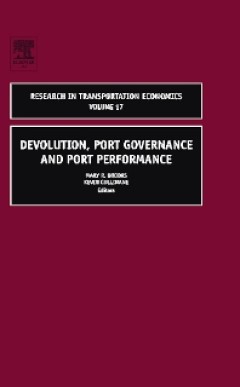Ditapis dengan

Port governance in the UK: Planning without policy
The UK's highly privatised port systemmeans that,while many of the issues in the port governance literature relevant to port concessions do not arise here, the respective roles of harbour authorities and port operators continue to be questioned. The concern in the UK is whose role it should be to monitor the capacity and service quality of the port sector, including how to govern the ways in wh…
- Edisi
- -
- ISBN/ISSN
- 2210-539
- Deskripsi Fisik
- 11 p.
- Judul Seri
- Research in Transportation Business & Management
- No. Panggil
- ATC PO IOS p

Port governance in the UK : Planning without policy
The UK's highly privatised port systemmeans that,while many of the issues in the port governance literature relevant to port concessions do not arise here, the respective roles of harbour authorities and port operators continue to be questioned. The concern in the UK is whose role it should be to monitor the capacity and service quality of the port sector, including how to govern the ways in wh…
- Edisi
- -
- ISBN/ISSN
- 2210-5395
- Deskripsi Fisik
- 11 p.
- Judul Seri
- Research in Transportation Business & Management
- No. Panggil
- ATC PO MON p

How competition is driving change in port governance, strategic decision-maki…
The period from 2007 through 2016 saw little change in the fundamentals of port governance in the United States. Instead, increased competition resulting from the consolidation of the ocean carrier industry, a slower forecast for U.S. container trade growth, port congestion on the U.S.West Coast and the potential for shifting trading lanes from an expanded Panama Canal became the predominant fo…
- Edisi
- -
- ISBN/ISSN
- 2210-5395
- Deskripsi Fisik
- 11 p.
- Judul Seri
- Research in Transportation Business & Management
- No. Panggil
- ATC PO KNA h

Devolution, Port Governance and Port Performance
This book is a product of five years of effort and a labour of love on the part of many. In the summer of 2001, a group of researchers interested in port governance and devolution, and their impact on port performance, met in Hong Kong. The research content of the book evolved over subsequent meetings in Panama in November 2002, Belgium in July 2003, Izmir in July 2004 and Cyprus in July 2005. …
- Edisi
- vol. 17
- ISBN/ISSN
- 978-0-7623-1197-2
- Deskripsi Fisik
- 701 p
- Judul Seri
- research in transportaion economics
- No. Panggil
- TXT PO BRO d

Port governance in Korea: revisited
Since the previous paper of us (Song & Lee, 2007), Korean ports, like others in the region and world, have experienced a number of challenges, which have driven the ports to make either a slight adjustment or a substantial re-organisation in terms of their governance structure. This paper aims to examine such drivers and subsequent changes taken place in Korea since 2007. This line of analysis …
- Edisi
- -
- ISBN/ISSN
- -
- Deskripsi Fisik
- 11 p.
- Judul Seri
- -
- No. Panggil
- ATC PO WOO p

Chapter 10 port governance and privatization in the united states : public ow…
Owing to its history as a nation fashioned from a federation of relatively autonomous states, port governance in the United States is largely in the hands of those 50 states rather than the federal government. Evolving from accustomed private ownership in the 18th and 19th centuries, seaports in the US are now commonly owned by public agencies, governed by public boards and yet often operated b…
- Edisi
- Volume 17, 207–235
- ISBN/ISSN
- 0739-8859
- Deskripsi Fisik
- 29 p.
- Judul Seri
- -
- No. Panggil
- ATC PO FAW c

Chapter 4 fighting for money, investments and capacity : port governance and …
Any economic analysis of seaport activity requires a clear definition of the concept of seaport and an understanding of the institutional context. Policymaking in ports, including Flanders, is largely controlled by an administrative authority. The reason for public authorities’ great interest is that ports are of enormous economic significance to the area governed. The degree of involvement…
- Edisi
- -
- ISBN/ISSN
- 0739-8859
- Deskripsi Fisik
- 23 p.
- Judul Seri
- -
- No. Panggil
- ATC PO MEE c

a Quantitative analysis of European port governance
The ever-changing environment in which ports operate has put strong pressure on the role of port authorities. The evolution of port governance has so far mainly been analysed in qualitative terms, through expert knowledge and case studies. This article fills a research gap in providing a quantitative analysis of port governance in Europe, using data from a major survey, which the European Sea P…
- Edisi
- Maritime Economics & Logistics (2012) 14, 178–203
- ISBN/ISSN
- -
- Deskripsi Fisik
- 26 pages
- Judul Seri
- -
- No. Panggil
- ATC PO VER q
 Karya Umum
Karya Umum  Filsafat
Filsafat  Agama
Agama  Ilmu-ilmu Sosial
Ilmu-ilmu Sosial  Bahasa
Bahasa  Ilmu-ilmu Murni
Ilmu-ilmu Murni  Ilmu-ilmu Terapan
Ilmu-ilmu Terapan  Kesenian, Hiburan, dan Olahraga
Kesenian, Hiburan, dan Olahraga  Kesusastraan
Kesusastraan  Geografi dan Sejarah
Geografi dan Sejarah